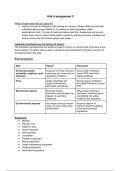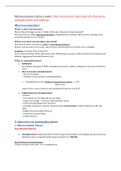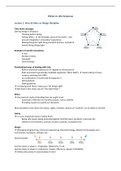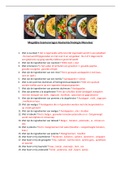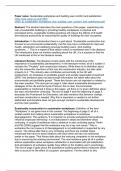Strong dictator
Hitler was in total command of key decisions where he took an interest.
Hitler was decisive in foreign policy and expansionism:
In 1936 Hitler took the decision to remilitarise the Rhineland against the
advice of his generals, he was instrumental in the Anschluss in 1938 and
ordered the invasion of Poland.
Hitler always intended on waging war in order to solve Germany’s
problems. It was Hitler who pushed for the full mobilisation of the war
economy, with the 1936 4 year plans and the appointment of Speer and
total war. over a quarter of the workforce were involved in rearmament
and 17% of Germany’s GDP was dedicated to military expenditure
As well as large scale policy he does get involved with smaller less significant
areas:
He repeatedly speaks out against modern art in a manner that cause
those under him to fundamentally alter the position of fine art in German
culture.
Divide and rule:
Hitler created competing power blocs, in an almost Darwinian fashion, watching
the individuals and institutions below him fight for power, leaving only the
strongest, and provided they remained loyal, would gain his support.
Personal rivalries characterised relations between chief Nazis. Goring and
Goebbels could barely stand each other and Bormann and Himmler hated
each other. It was certainly true that these men would not conspire
against Hitler, in fact the opposite, they competed against each other to
gain his approval, thus securing his power.
Hitler intensified this heated competitive atmosphere through placing rival
institutions in a position where they would have similar roles by creating
duplications or even triplifications of offices:
He broke up the unified control over party organisation set up by the
Strassers, dividing power between Rudolf Hess and Robert Ley.
From 1936, both the office of the four year plan and the economics
ministry had authority over economic policy.
Hitler also created competition between party and the existing state institutions.
He was not concerned about protecting the interests of neither party nor state,
he utilised both of them, in such a way that he was able to utilise the machinery
of the state, and the legitimacy of the party to his advantage:
the conflict between Hans Lammers, head of State/Reich Chancellery and
Martin Bormann, party secretary
The conflict between the Wehrmacht (Army) and the Waffen SS.
The conflict between Himmler as head of the SS and Frick as the minister
of the interior.
Hitler got rid of those who didn’t fully agree with his plans.
Those who criticised or merely advised against the mobilisation of the war
economy or war itself were removed:

